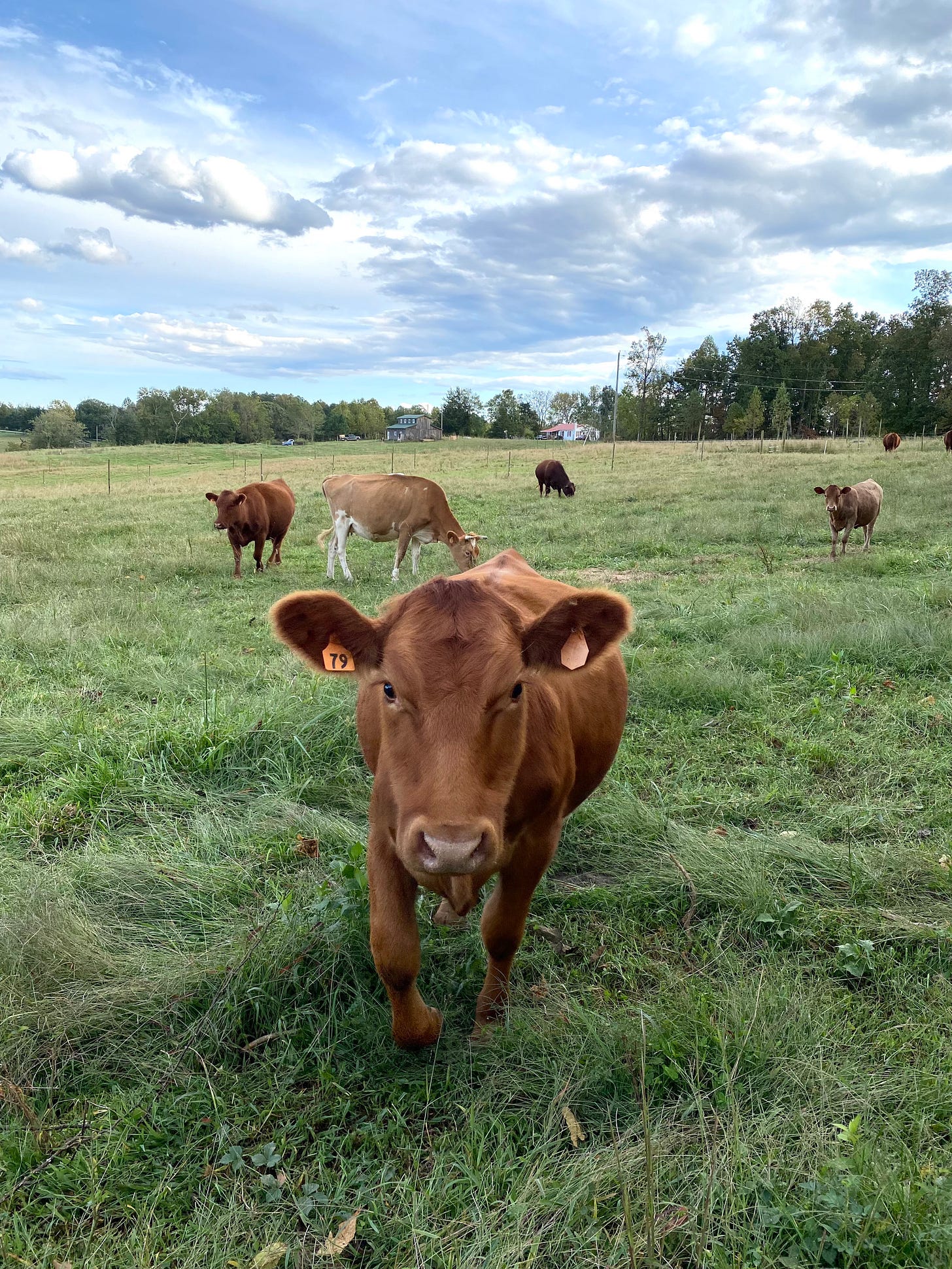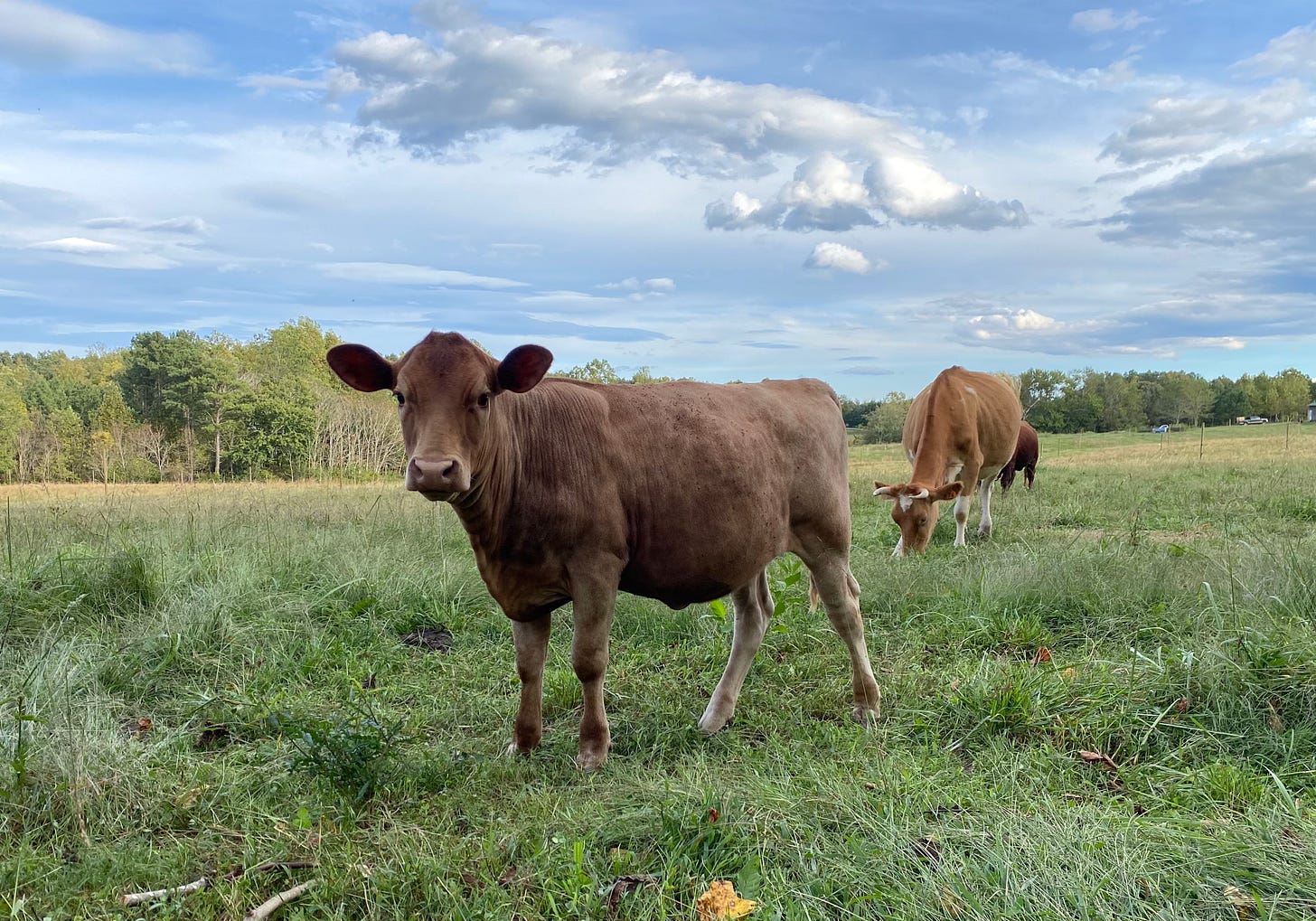Anxiety
Brought to you by my walk in the pasture
If I were my high-school English teacher, I would tell myself to narrow this topic significantly, that there’s no way on God’s green earth I could write a thousand-word essay on such a broad subject. I mean, there are volumes of books that cover the theme of anxiety and in much greater (and more medically accurate) detail than I could ever dream of doing. As it is, it took me more than 1700 words. Sorry.
But here I am (*waving*) talking about it anyway, because a few weeks ago I had a conversation with my youngest daughter and she made the most amazing statement that I have not been able to forget and I just have to tell you about it.
Seriously. If you want to get some great writing prompts, have a bunch of children and then wait until they become adults and learn things on their own and share them with you. I get some of my best ideas from my children, whether they come from deep discussions of very personal things or from watching one of them run circles around the house with all four of his little children running after him. (Well, one was crawling, but you get the picture.) My kids have made my life so rich.
But back to my daughter’s profound statement. It has already helped me in several situations, and I hope it will be a help to you too.
From the day of my birth until I was almost 57 years old, I did not know what anxiety was. If I suffered from it (and I did, to some extent), I was unaware it had a name. It was something I’d heard about but, like most people, grossly misunderstood. I did not know what it looked like in practical terms.
But worst of all, I judged people with anxiety while struggling with it myself, even though I knew exactly zero about it. I looked down my good-Christian-girl nose, rolled my eyes, and thought, “Get a grip,” or worse, “How unspiritual of you.” Can you see me cringing?
It wasn’t until I experienced my own brand of trauma (in the form of a car accident that left me with a diagnosis of PTSD) that I began to be honest about what I had lived with for a long time. I still have trouble defining what, exactly, anxiety is, but I think that’s okay because it probably feels different to everyone, and I just don’t think you can put these things in a box.
Just yesterday, for the first time, I decided to look up the definition of anxiety, and here’s what I found:
Merriam-Webster says the medical definition of anxiety is “an abnormal and overwhelming sense of apprehension and fear often marked by physical signs (such as tension, sweating, and increased pulse rate).”
American Heritage defines it as “A state of apprehension, uncertainty, and fear resulting from the anticipation of a realistic or fantasized threatening event or situation, often impairing physical and psychological functioning.”
The APA says of anxiety “Anxiety is an emotion characterized by feelings of tension, worried thoughts, and physical changes like increased blood pressure.” But then it includes this: “People with anxiety disorders usually have recurring intrusive thoughts or concerns,” and boy, if that doesn’t describe me.
All of these perfectly describe my experiences with anxiety. If you’ve never felt anxiety, here’s what I will tell you: it feels terrifying, and it is not just in your head. It is very much in your body, and your body has an actual physiological reaction to it that includes (at least for me) a pounding heart, higher blood pressure, release of cortisol, shaking, and usually ends with tears. It can last a minute or days. It may culminate in a panic attack. It is decidedly unpleasant.
Anxiety is a known, named, medical condition. It is not fake or made-up and if you suffer from anxiety, you are not just being a drama queen. It is very real and I am here to acknowledge that. But I don’t stop there. Since I am a Christian, I always want to know what God says about a subject.
A choice
In the version of the Bible I read (King James), the words anxiety and anxious do not appear. The closest thing is careful, literally “care-full” or “full of care.” There are two well-known verses that use the word careful in this way.
The first is in Luke 10 when Jesus comes to visit and Martha complains to him that Mary isn’t helping her serve. He says, “Martha, Martha, thou art careful and troubled about many things …” In other words, you’re so full of worries—worries about guests and worries about food and worries about doing stuff. He continues, “But one thing is needful: and Mary hath chosen that good part, which shall not be taken away from her.” One thing is needful, and it obviously isn’t how the food gets put out.
But don’t miss this: Jesus says, “Mary hath chosen that good part …” She chose it and Martha did not. Mary chose not to be full of worry over the serving of guests. She chose to listen to Jesus instead. It was her choice.
Now listen, I know some of you are saying, “But I can’t choose not to have anxiety,” and I hear you. Remember, I’m walking the same road you are, fighting the same battle. I know it’s not as easy as I’m making it sound.
What I get from this passage is that I don’t just have to be a victim of anxiety. I don’t have to sit there in my anxiousness being helpless. I have choices. Maybe not the choice to not have anxiety at all, but I can choose where to focus: on the worry or on listening to Jesus.
Remember, God doesn’t tell us how to feel, but he does tell us how to think, and what to think on. That’s because while we can’t choose our feelings, we can choose our thoughts, which are the basis of our feelings. Maybe negative, worrisome thoughts come into our mind many times a day, but we can choose to let them keep going. We don’t have to stop them in the middle and fixate on them or feed them. We can notice them, call them what they are (anxious thoughts that are probably untrue), and then usher them out the door. That’s the choice.
A prayer
The second well-known passage that uses the word careful is in Philippians 4:6, which says, “Be careful for nothing; but in every thing by prayer and supplication with thanksgiving let your requests be made known unto God.”
I don’t know about you, but when I am in a state of anxiety, it’s most likely because I feel like things are out of my control. And here’s where we get to the amazing statement my daughter made.
We were talking about worry and fears and anxiety and she said this:
Anxiety is rooted in a spirit of control. When I feel anxious, I ask, what am I trying to control that’s not mine to control?
I have not been able to forget that, and I’ve actually used it several times since we had that conversation.
Here’s the thing: When we are feeling anxious, our rational, thinking brain goes largely offline and our emotional brain takes over. Asking the question “what am I trying to control that’s not mine to control” forces the rational brain to get back in the game and not let the emotional brain take over and do something dumb.
THIS is why God tells us what to think. It’s because he wants us to use our rational, thinking brain to deal with a difficult situation rather than just let the emotional part rule the day and possibly make an unwise decision.
Please believe me when I tell you I am not saying our emotional brain is bad in any way. God created it, gave it a place and a function, and it is for our benefit. But he did not create it to run the whole show, just as he did not create the rational brain to always be the boss and never let the emotional brain speak up. Both parts have their function and place and they were designed to be used together to make life full and beautiful and rich with truth and feeling. One should never completely disregard the other, and neither should ever be totally squashed.
But after he tells us what not to do (be careful for nothing), he tells us what to do: “in every thing by prayer and supplication with thanksgiving let your requests be made known unto God.”
Friend, there is so much here.
Every thing: every single thing in all of life.
By prayer: talk to God.
Supplication with thanksgiving: thankfulness is an antidote to anxiety because it changes your focus.
Let your requests be made known unto God: tell him what you need.
He is our first line of defense and he is just waiting for us to ask.
Beyond this, I have a few strategies when anxiety comes around.
Cry. It is your body’s way of releasing excess energy and you will feel a lot better afterward.
Exercise. Again, release the excess energy. If I don’t have time to go for a long walk, I just stand up and shake myself to get it all out. Maybe don’t do this in public.
Take some long, slow, deep breaths. Google “box breathing.”
Ground yourself in the present by using your senses to notice 5 things you can see, 4 things you can feel, 3 things you can hear, 2 things you can smell, and 1 thing you can taste. This pulls the rational brain back online so it can temper the emotional brain.
Ask yourself the question, what am I trying to control that’s not mine to control?
Finally, come hang out with my cows. I’ve said before that I am an absorber of energy, both high and low. If people around me are stressed, I am stressed. If everyone is calm, I am calm. Standing in the pasture among peacefully grazing cattle is a first-class stress-reducer.
I hope there is some little thing here that will help you in your walk with anxiety, even if it’s just the knowledge that someone else is walking through it with you and understands how you feel. But please don’t just suffer. Get some help or try one of the strategies I shared, then tell me about it. I love hearing from you!








Your tips!!! So, so good!!
Thankful for simple clarity, Karen, well done! I also never understood or knew anxiety until I was an adult in my 40s. There’s only one basic thing that causes mine, and I know the answer to your daughter’s question...now to figure out how to move on from trying to grasp that control. ❤️ It’s hard.